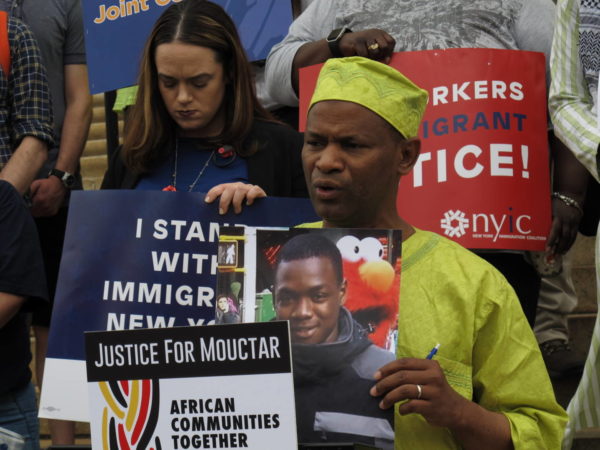NEW YORK, N.Y.—The crowd on the steps of the Bronx County Courthouse June 13 chanted alternating slogans. First, “Who are we? Teamsters!”; then, “Who are we? Africans!”

The about 40 people there were calling for justice in the case of sanitation worker Mouctar Diallo, killed on the job last November. Diallo, a 21-year-old immigrant from Guinea, was working off the books for Sanitation Salvage, a politically connected private trash-removal company, when he fell off the truck and was crushed under its wheels. The two company employees on the truck told police he was a homeless man who’d tried to climb on while it was turning the corner onto Jerome Avenue, in the northwest Bronx under the elevated 4 train.
“Our lives matter,” said Amaha Kassa, executive director of African Communities Together. “Stop treating us like trash. Mouctar Diallo was not trash.”
The Hunts Point-based Sanitation Salvage, says Teamsters Joint Council 16 President George Miranda, is “one of the bad actors” among the private trash-hauling companies that remove garbage from businesses in the city. Its workers do shifts as long as 18 to 20 hours, he told the rally, and those off the books, like Diallo, get paid $80 or less. The Teamsters are demanding that the city revoke the company’s license.

While some workers in the private cartage industry have unions, primarily Teamsters Local 813, most have none or have “phantom unions, as opposed to a legitimate AFL-CIO union,” Miranda says. Workers at Sanitation Salvage, once a union shop, are now supposedly represented by an “independent union” called Local 124. A similar non-union, a family-owned outfit called League of International Federated Employees Local 890 supposedly represents workers at Five Star Carting, Boro-Wide Recycling, and Liberty Ashes. Last year, it ousted Local 813 at Planet Waste in Maspeth, despite the National Labor Relations Board ordering the company owner to stop promoting LIFE 890 and harassing Teamsters supporters.
“The problem is there is a company union. They keep it there for a purpose,” says Miranda. “There’s no rules, no contract. Incidents like this tend to happen when you have no protection. There’s nobody speaking for the workers.”
If the Business Integrity Commission—the city agency created in the 1990s to break organized crime’s hold on the industry—was doing its job, he added, “they’d be cleaning up private sanitation.”
‘Our lives matter,’ said Amaha Kassa, executive director of African Communities Together. ‘Stop treating us like trash. Mouctar Diallo was not trash.’
The New York State Insurance Fund is suing Sanitation Salvage for $780,000 in unpaid workers’ compensation insurance obligations for on-the-job injuries, ProPublica reported earlier this month.
“We desperately need the city to take action,” said Local 813 member Miguel Mondesi.
In April, a Sanitation Salvage truck driven by Sean Spence, the same man who’d hit Diallo, fatally struck Leo Clarke, a 72-year-old Jamaican immigrant, in the South Bronx. “After 11 p.m. you have to watch yourself, because these trucks are running wild in our streets,” Wanda Solomon of Mothers on the Move told the rally.
“Who is it you have to kill to lose your license?” Amaha Kassa asked. If Mayor Bill de Blasio wants to make his Vision Zero traffic-safety program real, he added, he should do it “by holding Sanitation Salvage responsible.”
The Business Integrity Commission, which has said it’s investigating Sanitation Salvage, did not respond to inquiries from LaborPress.



